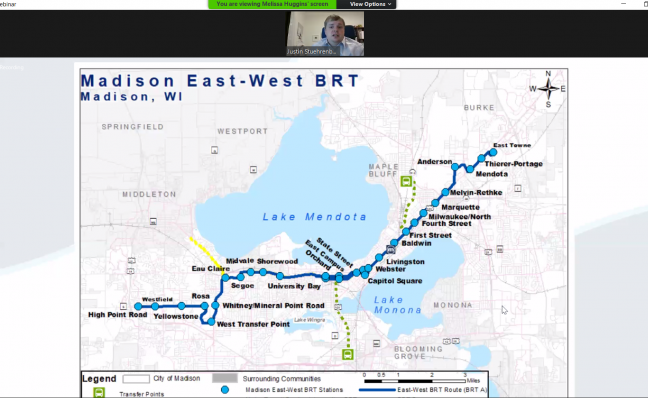The City of Madison held a virtual meeting today to kickstart the newly implemented Bus Rapid Transit system and to welcome public comments and questions on the topic.
The BRT system aims to improve the current system and reduce travel time for passengers. Madison Mayor Satya Rhodes-Conway said at the meeting that BRT will provide fast, frequent, reliable and affordable transit services for Madison.
The Common Council voted on adopting the locally-referred alternative in March 2020 for the first phase, Rhodes-Conway said. The project was accepted for a grant from the Federal Transit Authority’s Small Starts Program in August.
“Transit has proved to be an essential service for our community during the COVID-19 pandemic, and it has proven its ability to operate in a way that keeps everyone healthy and safe,” Rhodes-Conway said. “And with our new bus cleaning protocols, in fact, I think that Metro buses are cleaner than my car.”
Rhodes-Conway said the changes would improve connectivity between Madison’s low-income and transit-dependent neighborhoods and centers of employment and activity.
Metro Transit General Manager Justin Stuehrenberg said at the meeting that the overall project costs have been reduced by $16 million due to the City’s leveraging of federal and local funds.
Director of Transportation Tom Lynch said the new buses will operate from 5 a.m. to 12 a.m. on weekdays and 7 a.m. to 11 p.m. on weekends.
Proposed changes to how buses will run will include repositioning the bus lanes. Madison Transportation Planner Mike Cechvala said bus lines will be “center running,” which means they will be in the middle of the road as opposed to the sides. There will be a general purpose lane on each side of the bus lane.
Some on-campus stops include a station pair at Orchard Street and at East Campus Parkway, which are located on Johnson and University, respectively, Cechvala said.
Bob, a member of the public, questioned why the city is not using some buses temporarily as BRT buses to gauge public interest and get some data on how the buses will operate instead of assuming the efficiency of the system.
“We have not fully compiled ridership data for the year, but on data point is ridership affiliated with the University in the 2019-2020 school year was on pace for the best year since 2014,” Stuehrenberg said.
Madison Metro tallied 12,856,541 rides in 2019, which represents a slight decline from 2018 ridership. The decline could be attributed to the polar vortex in January and shifts in transit usage by the Madison Metropolitan School District, according to a 2019 annual report.
A neighborhood meeting for the University of Wisconsin campus will be held in spring 2021. Services will begin in 2024.


